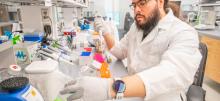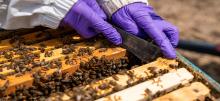
Study Shows Consumer Confusion Over ‘Made in USA’ Labels
A new study from advertising and public relations researchers at Michigan State University’s College of Communication Arts and Sciences digs deeper into consumer attitudes, perceptions and behaviors of “Made in USA” claims. Published in the Journal of Law, Business and Ethics, it is only the second peer-reviewed study to explore what “Made in USA” claims mean to consumers.

Study Finds Print Wins Over Digital for Preschoolers Learning to Read
New findings from Michigan State University researchers suggest that some popular approaches for learning may not be as practical as parents think. Preschoolers who played more literacy games scored lower on reading assessments, while those engaged in print-focused activities saw the most significant gains.

Nanomedicine and AI Uncover Rare Biomarkers for Early Disease Detection
A Precision Health team has combined nanomedicine, artificial intelligence and causal analysis to uncover rare biomarkers for prostate cancer and heart disease. This breakthrough is the first to directly connect these biological clues to disease. The approach could transform early detection and open the door to more personalized treatments.

Buzz-Worthy: Spartan Research Saves the Bees
A new $12 million program will tackle nutrient runoff in the Western Lake Erie Basin. Funded by the Michigan Department of Agriculture and Rural Development, the initiative uses a performance-based approach to improve water quality. Partners will work with farmers to target conservation where it delivers the greatest impact.

$12M Investment to Advance Performance-Based Conservation in Western Lake Erie Basin
Michigan State University’s Institute of Water Research has recently received a $12 million investment from the Michigan Department of Agriculture and Rural Development (MDARD) to address nutrient contributions to the Western Lake Erie Basin (WLEB) in Michigan.

The Legacy of the Innovation Lab for Legume Systems Research
For over 40 years, legume research advanced farming and global food security. The MSU-led Legume Lab, ended in 2025 due to USAID cuts, had aimed to build resilient, sustainable systems and support future scientists.

Graham Receives Grant to Study Absenteeism, Student Well-Being
Assistant Professor Jerome Graham of Michigan State University's College of Education will examine the relationship between chronic absenteeism and student well-being across Georgia with a $450,000 grant.

New Study Reveals How Corals Teach Their Offspring to Beat the Heat
Caused by stressful conditions like warming ocean temperatures, coral bleaching is a leading threat to some of our planet’s most diverse and vital ecosystems. Now, a team of researchers has found that some corals survive warming ocean temperatures by passing heat-resisting abilities on to their offspring.

Feeling More Extroverted? Study Finds You May Have Learned How to Handle Daily Stress Better
A new study led by Michigan State University found that as people get better at handling stress on a daily basis, they also become more extroverted, agreeable and open to new experiences over a nearly 20-year period. Likewise, the worse they manage daily stressors, the more introverted, unfriendly and closed off from new experiences they become.
